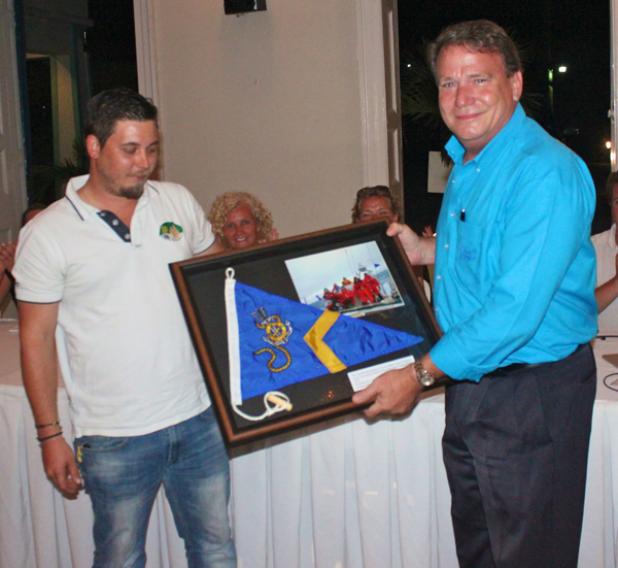
Clipper Round the World Alumnus, Michael Jones, handing over a photo of the Visit Seattle crew to Barbados Yacht Club Commodore Geoffrey Evelyn.
Local boy sails around the world
Michael Jones is a name that will live on forever in the annals of local yachting, as the young sailor became the first Barbadian to sail around the planet in the latest edition of the Clipper Race Round the World. Completing the mammoth achievement as Visit Seattle – the vessel he was a crew member on for 11 months, which sailed into London’s St. Katherine’s Docks on July 30th – the 33 year-old counts it as one of his greatest to date.
Jones and some of his Visit Seattle crew mates were on-hand on at the Barbados Yacht Club on Monday night to recount some of their experiences since shipping out from London at the end of August last year. With a heavy background of sailing aboard Ralph Johnson’s Rapajam and Bruggadung when he was younger, Jones said that he never thought he would go as far as sailing in such a ‘crazy’ race.
“After growing up here sailing in the Caribbean, and doing various regattas around the region, I decided one day that I wanted to actually learn how to sail. So I went up to England and did the RYA (Royal Yachting Academy) Offshore Yacht Masters, and when I finished that, I actually saw the start of the 11-12 race, and to be fair, I thought they were all crazy then.
“I still think anyone who signs up for the race has a few screws loose, but that’s what makes the race as special as it is. It’s a bunch of random people that don’t know each other, thrown on a boat together and told to sail from point A to point B, and you figure out how to make it work,” Jones explained.
With 12 vessels undertaking 14 races across 44 000 nautical miles, the races are open to anyone over the age of 18, able-bodied and with a healthy appetite for adventure. With crews numbering approximately 20, Jones’ team was made up of 10 persons who made the complete circumnavigation, and others who did legs of races between some of the ports.
With four weeks of intensive training necessary for all team members, Jones was assigned as engineer and navigator in his crew, and said the pre-race training was not enough to prepare persons for the adventure ahead.
“Navigation was kind of fun. We had two huge computer screens onboard. One was a GPS and the other was a chart-plotter, and the race office would send us our daily weather once a day. You would input the weather into the chart-plotter and set out different routes depending on what the weather was telling you what it was going to do. I don’t think it ever did what it was supposed to.
“So hours spent at the nav station trying to decide where you were going to go could have been spent up on deck and enjoying the sunshine. But it was good fun. Weather is a fairly important aspect as you are planning your route. You try not to hit big storms. In our case, we decided to sail through most of them. It is a thing that you try to plan, but obviously the weather is going to do what it want to do and you can’t tell it otherwise.”
Finishing 8th overall after losing the final race by just 22 seconds, Visit Seattle took away the Stormhoek Social Spirit Award, and boasted a crew from 16 nations and speaking 19 languages.
Skipper, Matthew Mitchell, said that running a vessel with 20 persons with different personalities and backgrounds was challenging. Noting that this was his second back-to-back voyage, having done the 2013-2014 race, Mitchell added that it was a heavy responsibility ensuring the safety of everyone and the smooth operation of day-to-day functions.
“Being a skipper, you have to be a bit of a control freak, but there is no way you can do that all by yourself. The guys pay a fee for their berth, and we want to get them as much experience of the day-to-day running of the boat as we can. Although all these things would be looked after by individual members of the crew, as a skipper, I can’t just go back and think that everything is looked after.
“It is up to me to make sure everything is done properly. From the day-to-day maintenance of the generator, engine and water-maker, all the way through to making sure there is enough for everybody to eat, there is enough water for us all to drink and all is well with the navigation and the crew,” Mitchell said.
Stating that smaller goals needed to be set in order to make his way through, Jones added that the entire experience had its highs and lows. Counting sickness, injuries and his greatest enemy – the cold weather – as some of his lows, Jones said that for him, being able to bond with his crew mates was one of the high points of the entire year-long experience.
“For me, the highs were reaching a stage where the team almost worked without having to speak. Everybody knew what had to be done. It was almost like a smooth-running machine. You didn’t have to talk to anybody, it just happened. And watching the team do that after months of it not happening that way was a really big high,” he said. (MP)
